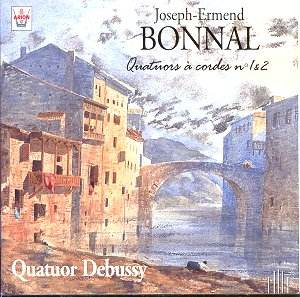Joseph-Ermend BONNAL (1880-1944)
String Quartet No. 1 (1919) [33.31]
String Quartet No. 2 (1938) [21.08]
 Quatuor Debussy
Quatuor Debussy
rec Aizac (07), 6-9 Oct 1999
 ARION ARN 68504
[54.39]
ARION ARN 68504
[54.39]
Crotchet
AmazonUK
AmazonUS
Amazon
recommendations

I have the impression that France is all too ready to allow apathy to choke
the glories of their late-romantic musical culture. Why are there no recordings
of Guy-Ropartz's symphonies (excluding number 3)? What has France done for
Lazzari, for Canteloube, for Witkowski .... the list continues.
Against the trends Arion have issued this diamond of a disc by a composer
I have never heard of let alone heard.
Bonnal was born in Bordeaux and entered the Paris Conservatoire at age seventeen.
There he studied with de Bériot, Vierne, Tournemire and Fauré.
He held various organist positions and indeed wrote much for the 'King of
Instruments'. In 1920 after being denied the post of organ professor at
Strasbourg he took up various teaching and organ appointments at Bayonne.
His music struggled against the illogical snobbism associated with a provincial
(i.e. non-Parisian) career.
The four movement First Quartet is a work of Ravelian abundance and
torrential floodtide. The lyrical candlepower of the music comes from the
same source as the Ravel quartet, the Herbert Howells Piano Quartet and the
Fauré Piano Quartet No. 1. The Quatuor Debussy must surely have played
these works in concert for their confidence is undeniable. In the second
movement of No. 1 they inhale the bustling undisciplined air of woodland
and headland - honeyed spinneys, dazzle, spume and ozone. The third movement
relents with a more expressionistic line shadowing Schrecker and Van Dieren.
Not so long ago I was listening to the Nimbus recordings of two of the Karl
Weigl quartets. I noted a kindred nostalgia in this third movement as I did
in Weigl's Fourth and Fifth Quartets. For the finale we are back to Ravel
and early Fauré with a hint of Warlock's instrumental writing for
The Curlew. The delicacy and faultless judgement of the Quatuor Debussy
(eg at 06.10 in IV) are blessings indeed to Bonnal's music. The Calvet Quartet
toured this work across the world. The wonder is that it has, until now,
disappeared from view.
Bonnal had as much of an interest in folksong (specifically that of South
West France) as Canteloube had in folksong generally. Folksong enlivens and
is as much part of the warp and woof of his music as in the cases of Moeran,
Vaughan Williams and Bartók. Its inheritance is woven into the
impressionistic skein, the lithely drawn lines and tickling dynamic gradations
of all this music. Listen to the range from pp to ff in the fourth movement
of the First Quartet.
The Second Quartet is marginally more distant and sepia-toned but
the complexity and floating, seethingly mellifluous liquefaction is still
there - resolute and winged in both the first and last of the three movements.
This is a real discovery denied even the benefit of the Calvet's international
advocacy. Bonnal died six years later in the middle of the Occupation - too
late to see the liberation.
The Quatuor Debussy and note-writer Michel le Naour have convinced me that
Bonnal's music deserves much greater currency. Arion have not stinted on
translation either. The English version reads with fluency and despatch.
Can I just add that Arion's design values far excel the sad norm established
elsewhere in the classical CD field. The choice of the Odile Redon landscape
which adorns the cover was a masterful one. As with many French discs the
jewel case has gone and in its stead we get a sturdy triple fold card case
with the usual mounting rose for the CD and a pocket into which slips the
booklet. I can only hector Arion about the lack of more Bonnal on this disc.
Let's have more please. Let's also have recordings of the two orchestral
symphonies, the Symphonie for organ and orchestra (a natural for Guild, surely),
the Basque ballet and suite and the Fantaisie Landaise for piano and
orchestra.
Bonnal is as desperately neglected as Witkowski whose orchestral music must
surely be revived, as must that of Joseph Marx whose Herbstsymphonie and
Naturtrilogie I keep haranguing you with, Silvio Lazzari's opera La
Lépreuse, and the five symphonies of Guy-Ropartz.
I urge you strongly to seek out this sheerly magical music.
Rob Barnett

